SINGAPORE: In a crowd, Dr Lee Bee Wah would easily go unnoticed. She is nondescript. On most days, she dons a polo shirt and pants.
While she looks ordinary and non intimidating, it very quickly dawns on those who speak with her that the opposite it somewhat true, especially if you’re a civil servant unwilling to address her requests for her residents.
The brash, straight-talking Member of Parliament for Nee Soon GRC has made headlines numerous times since she joined politics in 2006.
She is known for tenaciously fighting for her constituents’ needs, from lifts at overhead bridges to ensuring that every Build-to-Order HDB development has a childcare centre.
She has also advocated controversial policies such as rewarding people who catch litterbugs red-handed.
When government agencies deny her requests, she pursues them doggedly to find out why. As they list the obstacles, she counters them with solutions.
Her engineering background often comes in handy.
For instance, when the PUB told her that a lift could not be built at an overhead bridge at Khatib MRT station because of water pipes and cables beneath, she suggested designing around them using her expertise as a civil engineer.
Today, lifts at overhead bridges outside MRT stations have become almost a norm across Singapore to assist the elderly, disabled and pregnant women.
She is particularly proud of this achievement and brings it up at practically every interview about her political career, including this one.
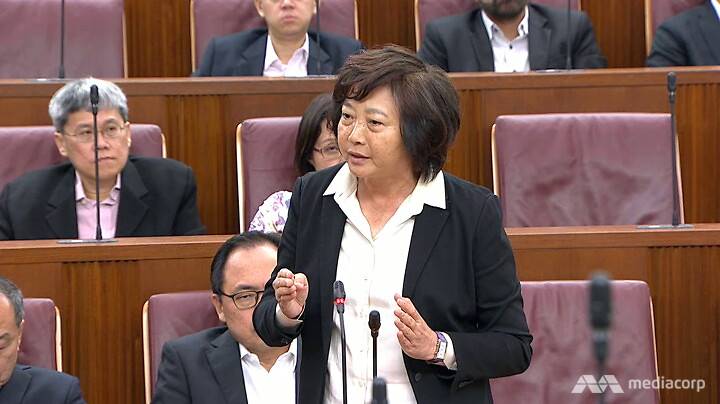
MP Lee Bee Wah in Parliament.
To understand where her grit and determination comes from, one needs to go much further back into her past.
MEMORIES OF PORRIDGE AND CHILLI
It is widely known that Dr Lee was born in Malacca into a family of rubber tappers. She was the eldest of eight siblings. Her days started as early as 4am. With her siblings, she would venture through the plantation and tap rubber, her family’s main source of income.
“Only after that, we would go to school. After school, we would come home, and go to (the) kitchen to look for porridge. If there was porridge, then we’d go and look for soya sauce or chili,” she says.
“That’s why until today, I love just porridge and chilli.”
There were times, when the family would have to wait till evening for their only meal of the day.
Much has also been said over the years about how even when her parents asked her to quit school to work to support the family, she defied them with support from a teacher who helped her get scholarships from clan associations to finance her education. She worked part-time to help support the family and took on various jobs including selling stationery and goreng pisang to factory workers.
“I also wanted to make sure that every one of my siblings got the opportunity to go to school and that is why when I was in university, I would give tuition to make money. When I started working, in the day time I was a civil engineer but at night, I was a tutor. I gave tuition from Monday to Sunday so that I could send money home.”
MORE GROUND-UP INITIATIVES FOR INTER-RACIAL MINGLING
Dr Lee’s childhood came to the fore again recently when she shared in Parliament, her recollection of how rumours helped fan racial tension in Malaysia and Singapore in 1969.
At the time, her third brother was just born and her mother had told her that should they come under imminent threat, they must all escape to the jungle, but must leave the baby behind because his cries would expose their whereabouts.
She is grateful that day never came.
“We were very fearful. We moved from one relative’s house to another just to avoid being attacked.
“But there was one home near ours that was attacked. The whole family perished except the father who managed to run out of the house.”
As a result, she is even more appreciative of “the racial harmony that the Singapore Government has been advocating all these years”.
But while Singapore is doing “relatively well compared to other countries”, she feels more can be done.
“I also get feedback that in some schools, the Malay kids play soccer on their own and the Chinese kids play basketball on their own. Though they study in the same class, they don’t play together.”
While she says inter-racial mingling can’t be forced, more needs to be done to encourage people to mingle willingly.
“The best way is to make them understand, show them historical footage of the riots. There need to be more ground-up initiatives to encourage this. Ground-up initiatives will get more buy-in.”
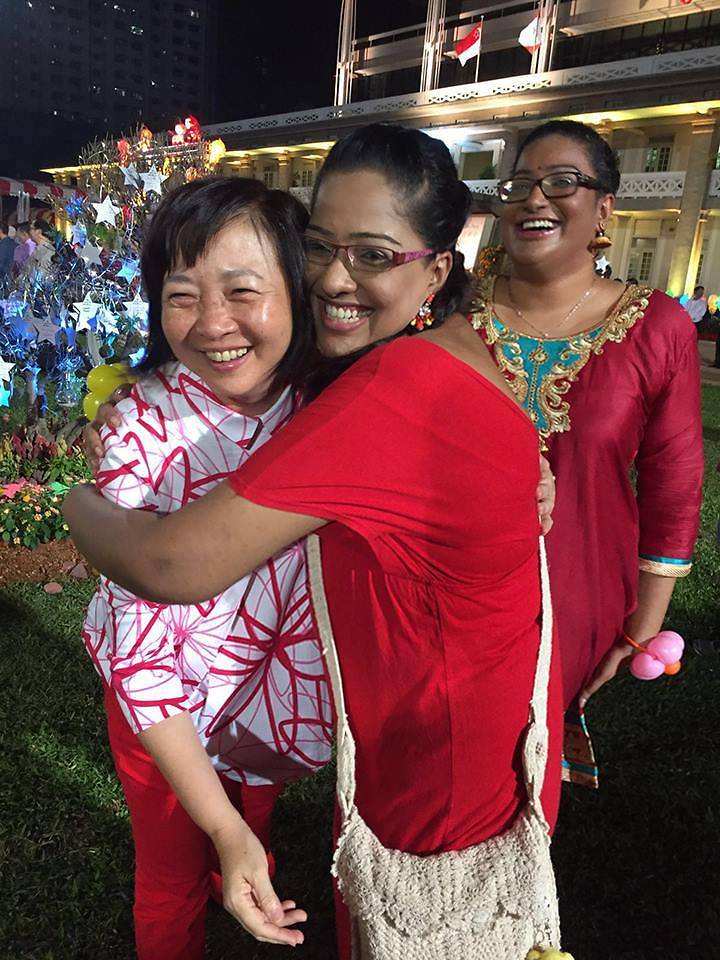
Lee Bee Wah with residents of Nee Soon South. (Photo: Facebook / Lee Bee Wah)
AN ENGINEER’S VIEW ON OUTSOURCING – NOT EVERYTHING IS ABOUT MONEY
Her choice of engineering as a career was deliberate.
Her A-level maths teacher encouraged her to enter the field because “engineers can make a difference to society”.
Luckily, she had the instinct for it from very young.
“I used to help my brothers repair bicycles. Sometimes we had to repair the roads because the road from the village to school would have a lot of potholes after heavy rain. We even built our own portable toilet. At that time my thinking was, if I’m an engineer, I can build all these infrastructure, change the lives of people.”
She laments the dearth of engineers in Singapore today.
“During our nation-building years, many of our civil servants, even ministers, were engineers by training. But as the country developed, people started to study business and other professions like law, medicine, and they made more money.”
But another major issue she suggests is that the civil service started outsourcing work that required engineering expertise.
“They want to do things in a more cost-effective way, so they don’t have in-house engineers anymore.”
Even though she has her own engineering firm, she believes in-house expertise is key.
This naturally takes us to a discussion of our transport system.
“It’s cheaper to outsource, but not everything can be measured by dollars and cents. In such areas, we need our own engineers. When you don’t have the in-house expertise, you will just take whatever the outside consultants or contractors give you.”
She notes recent attempts to beef up in-house engineering talent and to offer better remuneration to attract more to the profession.
Nevertheless, I ask if she feels trust in the government has been eroded by problems in the rail transport system.
“We should not sweep things aside and say this is not a problem. If it is a problem, we acknowledge that it is a problem and then look at the possible solutions. I think overall, the PAP Government has been doing that. Minister Khaw Boon Wan is putting in more effort now and SMRT Chairman Seah Moon Ming is focusing more on this.”
Many people might say all this should have been done much earlier.
“The problems nowadays are much more complicated. We know that if we had put much more effort into the maintenance regime, we may not have ended up like this. What’s important now is that we must put in effort.”
Even though she tempers her criticism with such statements, some in the Government have not been able to take her straight-talking ways.
DON’T MINISTERS WANT HONEST FEEDBACK?
“During my first term as MP, I know that some ministers complained to the Prime Minister about me. But I told PM that this is the feedback on the ground. Don’t you want honest feedback? Don’t your ministers want honest feedback?
“I think PM understands I’m just doing my work. I’m not there for a promotion. Whether you like me or not, is secondary. If you cannot take such feedback, too bad. If you want me, I will do my very best. I will give you 101 per cent. If you don’t want me, I will just walk away,” she says decisively.
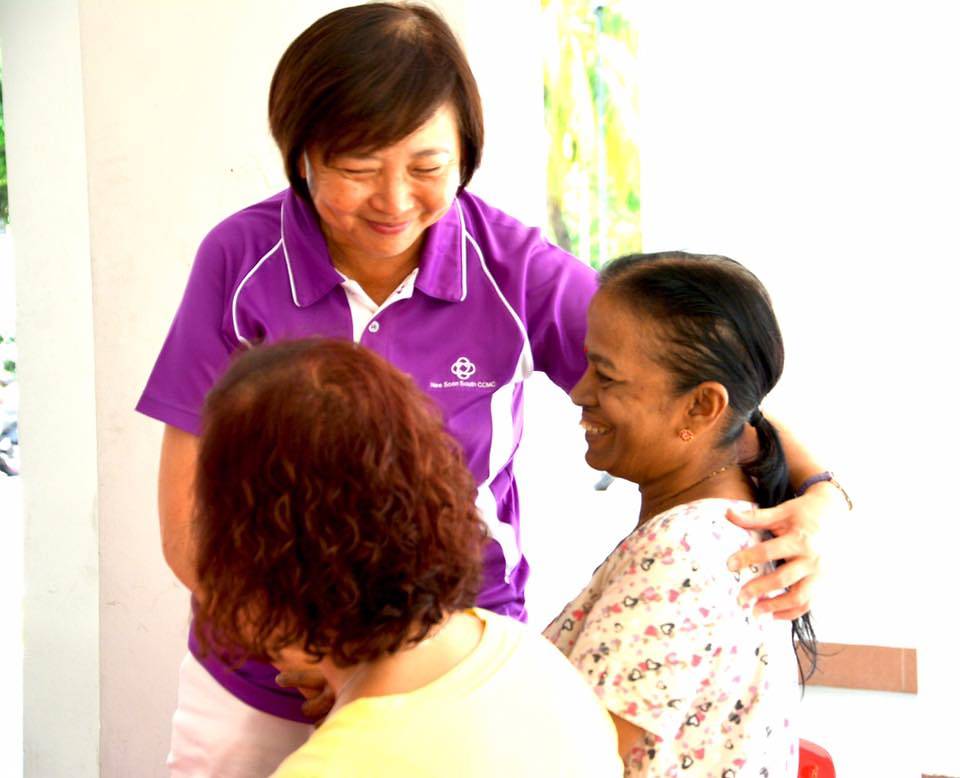
Lee Bee Wah prides herself on being able to connect with residents. (Photo: Facebook / Lee Bee Wah)
Among civil servants, she has quite a reputation too.
“They told me that those who are the ‘can work’ types, love to work with me because I can make decisions very fast. Those who are the ‘cannot work’ type are very scared of me.
“I even have friends who tell me, ‘Bee Wah, when you step down, then you will know, this civil servant will get back at you’. So be it. If I’m afraid then there’s nothing much that I can do, right? So if you really want to serve, don’t be worried.”
Does she ever tire of coming up against road blocks with the ‘cannot work’ types?
“No. I take it as a challenge and whenever I manage to solve some of these road blocks I feel that it is an achievement.”
DON’T GIVE “CUT AND PASTE” ANSWERS TO RESIDENTS
“Civil servants should come down to the ground more often and understand the problems that we’re discussing. Some do. Some still don’t. They shouldn’t just give “cut and paste” answers to residents.”
She points out that often, the policies are sound on paper, but problems arise at the implementation stage.
For instance, she feels the Government’s move towards a car-lite nation is premature.
“We encourage cycling. But are we ready? Obviously not. We’re seeing some accidents on pavements, void decks and roads. We can’t share. I went to Copenhagen and I saw their cycling paths. People cycle all in one direction. In fact, they cycle quite fast. But they have a zebra crossing across the cycling path and they have stop signs and the cyclists really go according to rules.
“We are not there yet. The infrastructure is not ready. The mindsets of the people are also not ready.”
Considering her overt frustrations at certain ministries, I wonder if she ever considered joining an opposition party instead of the PAP.
“No, I did not. My family and I have always admired Mr Lee Kuan Yew and the clean system he built. When I joined as a grassroots and branch volunteer, I saw that PAP members and MPs are serving selflessly. They are an important part of the system that has served Singapore so well. The PAP sets a culture that ensures our leadership has the right intentions, even if I disagree with them on specific issues and implementation.”
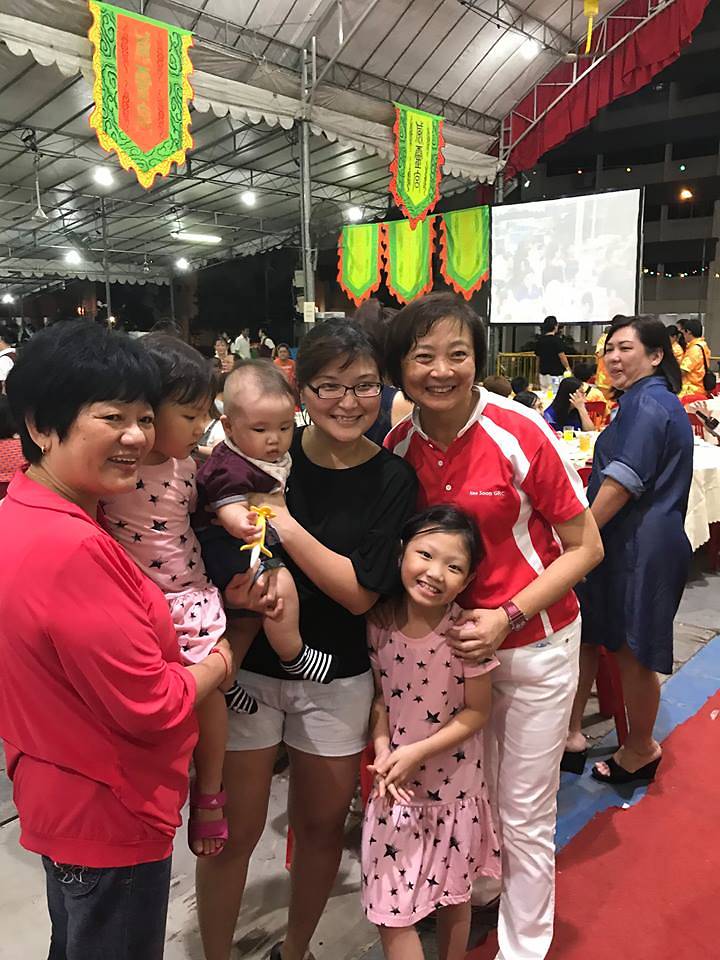
“I think it’s better to be a backbencher. I feel as a backbencher, I have more time to walk the ground and wholeheartedly pursue my residents’ interests,” says Lee Bee Wah. (Photo: Facebook / Lee Bee Wah)
NEVER HAD AMBITIONS TO MOVE BEYOND THE BACKBENCH
She was approached by the PAP in 2003, shortly after having surgery for early-stage colon cancer. After part of her colon was removed, she was declared cancer-free.
She sees her political career as a her second chance in life.
Some of her supporters have often wondered if she would do even better as political office holder. However, she’s never had such ambitions.
“I think it’s better to be a backbencher. I feel as a backbencher, I have more time to walk the ground and wholeheartedly pursue my residents’ interests.”
HIGH EXPECTATIONS
While she leads a more comfortable life today, she’s been known to be frugal, hardly spending money on clothes and hardly ever sleeping in air-conditioning at home.
“I believe in spending within our means,” she says.
But she’s clear about never wanting to return to a life of poverty.
“Not too long ago, my daughter asked me, ‘Mummy, if we can turn back the clock, would you like to go back to your childhood days?’ My answer straightaway was no, no, no.
“Life was too tough. We had to work a lot from morning until evening. Our home was on top of a hill and there was no piped water, so we needed to carry water up the hill every day.”
While she doesn’t want to go back to those days, she admits that those experiences moulded her character.
“I was the eldest in the family, so I just took it naturally as part of my duty. Whenever I come across any obstacles now, I will take it as a challenge and look for solutions. So it also caused me not to give up easily.”
Considering the hardships she went through in her childhood, I wonder if she thinks people who insist on lifts at overhead bridges and so on are spoilt.
“Different generations have different expectations. It also shows that we have progressed. People’s education levels are higher. They read more widely, so naturally their expectations are higher.”
She does consider some complaints unreasonable though.
“For example, when residents complain about having to wait three minutes for a bus at the bus stop.”
Her next project is to push the government to bring the Home Improvement Programme to flats in her constituency that are technically ineligible.
“The programme was announced in 2007. At that time, they said that flats built in 1986 or earlier will get it. In Nee Soon South, half the flats are built in 1987. Just a one-year difference. These flats are now 30 years old. We need to give them the Home Improvement Programme because a lot of things are starting to fall apart.”
While some Singaporeans may things for granted, Dr Lee doesn’t seem to.
When she was 20 and still in Malaysia, her father’s application for low-cost housing failed because he refused to pay a bribe. Disillusioned with the system, he gave her RM20 and encouraged her to go to Singapore.
“Many of us in the village really admired Mr Lee Kuan Yew. So my father said, ‘You should go to Singapore because it has a very good leader and it is a meritocratic country.’
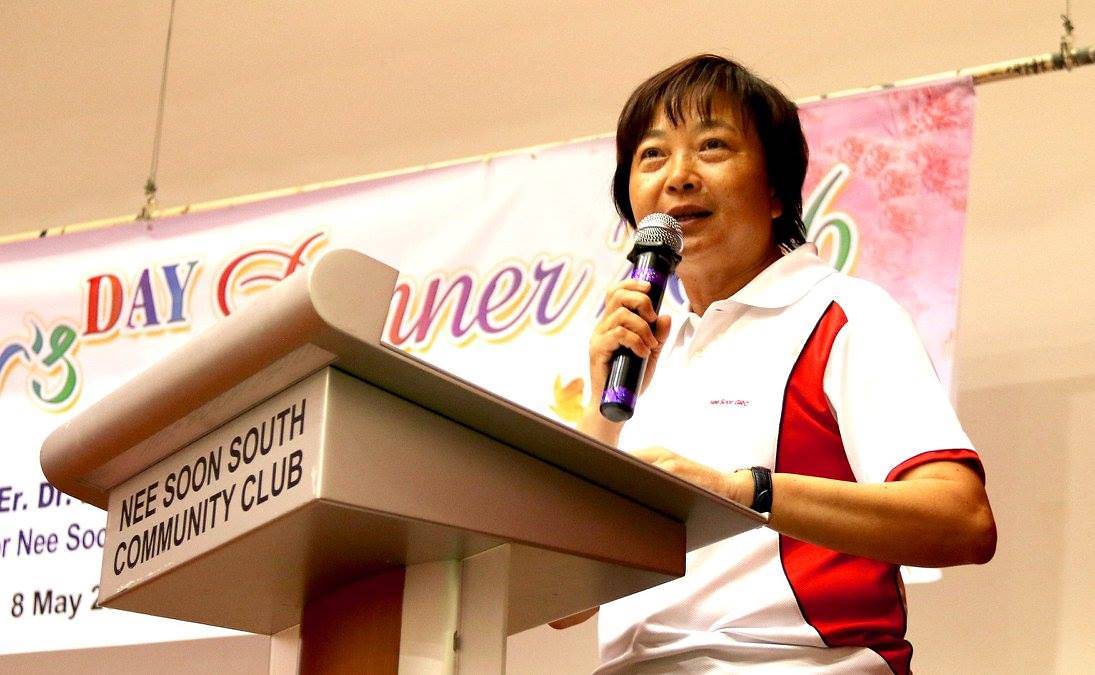
Lee Bee Wah is in charge of the Nee Soon South ward. (Photo: Facebook / Lee Bee Wah)
TAKING MATTERS INTO HER OWN HANDS
While a great admirer of the Singapore system, she clearly acknowledges it’s not perfect.
She understands that resistance to her proposals is sometimes tied to budgetary constraints or a failure to see her requests on behalf of her residents as a priority at that point.
At times, she takes matters into her own hands.
For example, to curb her residents’ exposure to secondhand smoke, she worked with the National Environment Agency on a pilot programme to set up enclosed designated smoking points in Nee Soon South. When she saw the benefits of this and decided to expand it, she couldn’t get the government agencies on board, so she tapped her contacts within the neighbourhood and her business contacts. In 2017, she managed to raise S$500,000 to build 50 more smoking points.
She has also initiated fund-raising activities to finance the educational needs of needy kids in the neighbourhood.
“The Government actually has given out a lot of educational bursaries and scholarships but there are some that fall through the cracks. In some cases, it’s temporary. Maybe a family member falls ill, stops work for a while or it’s just that during that month, they have extra expenses.”
“WE SHOULDN’T RUN TO THE GOVERNMENT ALL THE TIME”
But why can’t the government do more to help in such cases too?
“I think as a society, if those who can afford it can come forward to help their fellow neighbours, it will be even more meaningful. We shouldn’t run to the government all the time.”
How would she address some Singaporeans’ comments that the Government is wealthy enough to support even more social spending?
“I think if you were to look at the Budget for the last few years, the expenses of the various ministries have gone up quite a fair bit. Every ministry has its own priorities, its own budget to work with. Of course if we can get the money from the Government to help, that’ll be good, but if the government cannot help, that doesn’t mean that’s the end. We can also help our own neighbours, our own residents.”
While she has often asked for more to be spent on certain initiatives, she is also concerned about sustainable social spending.
“In the end, the budget must be balanced. If we want to continue with giving out more subsidies, then the government’s income will have to increase as well.”
MAKING A MARK IN THE SPORTING WORLD
Aside from politics, Dr Lee has also made a mark in the sporting world as President of the Singapore Table Tennis Association from 2008 to 2014. Under her charge, Singapore’s table tennis players won regional and international awards, including medals in the 2008 Beijing Summer Olympics and in the 2012 London Olympics.
These wins by China-born athletes also raised controversy over the Foreign Sports Talent Scheme.
She is quick to point out that the scheme was not started by her.
“In fact, when I came on board, we put much more effort into pathways for local talent.”
The STTA began collaborating with the Singapore Sports School to start the “school within school” to support local student-athletes.
“We also worked with community centres to make table tennis popular.
“Perhaps there were some merits of foreign talents because they are of higher standard and we also learnt their training system. But after 20 years, it is time to review because we already know how they train, we already know the system. If we still rely on them to get medals, I don’t think it’s the right thing to do.”
She has also advocated more flexibility in approving National Service deferments for male athletes to allow them to concentrate on their sport, saying that even those who have not reached the top rankings should be allowed deferments if they have the potential of getting there.
However, her Facebook post in 2016, seemingly taking credit for Olympic gold medal-winning swimmer, Joseph Schooling’s NS deferment garnered a lot of flak.
“Maybe I was just very happy and posted very fast. But it is a fact that I have spoken in parliament several times about him too.”
But does she admit that it was his parents who did most of the legwork?
“Of course. I know they’ve put in a lot of effort. I never said that I did it for them. It is just that when the parents discussed their problems with me, I brought it up in parliament.”
But even while advocating for local athletes, she tried to integrate foreign-born athletes into the Singapore system. At one point, she attempted to have them take English lessons. But their busy travel schedule prevented the athletes from complying.
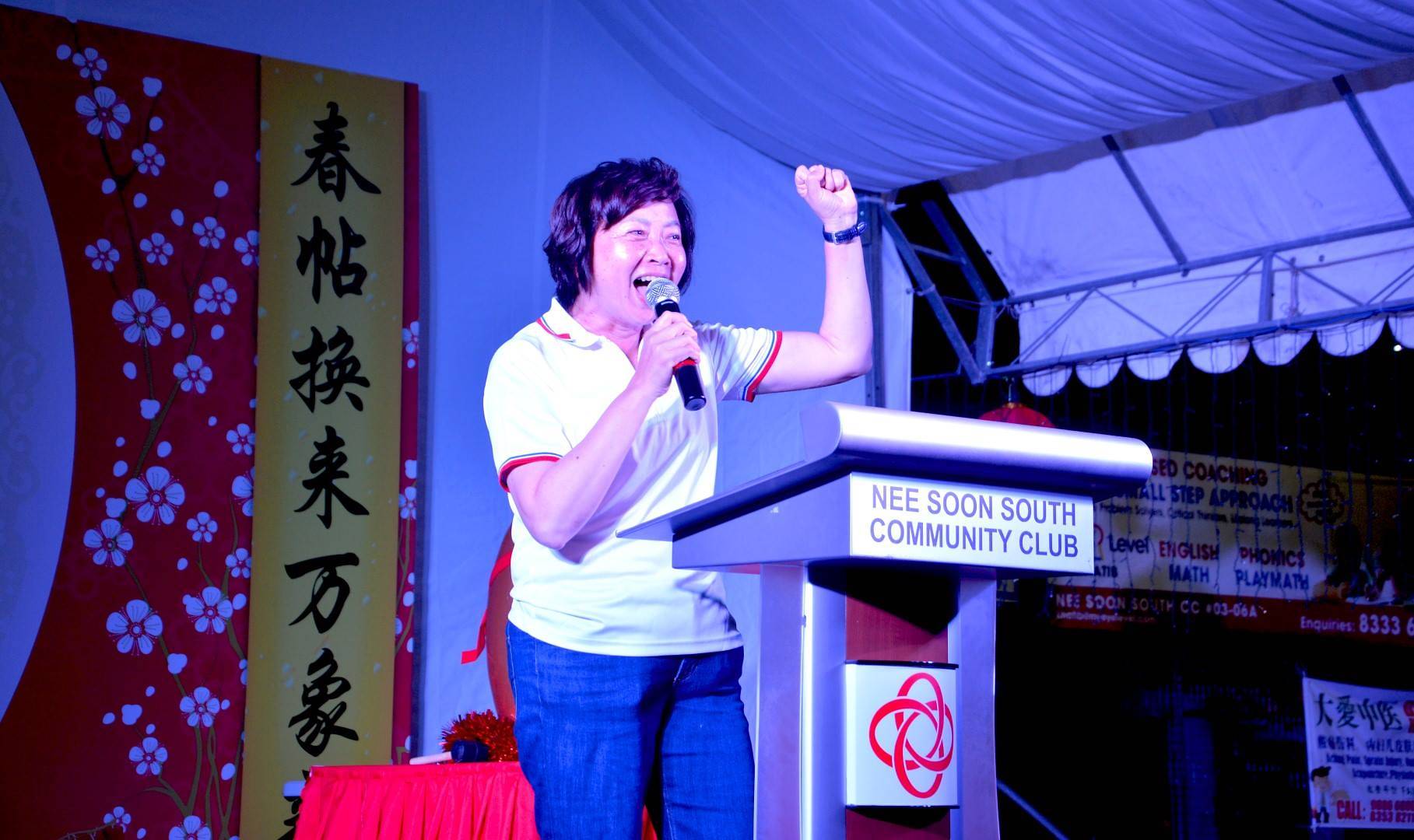
“Do you want an MP who speaks very good English or do you want an MP who really dares to fight for you?” says Lee Bee Wah. (Photo: Facebook / Lee Bee Wah)
“A LOT OF PEOPLE THINK MY ENGLISH IS QUITE ODD”
“The lessons were not very regular and language is something that you need to practise. For example, a lot of people think that my English is quite odd. I don’t speak English fluently like a lot of Singaporeans. It is because I studied in a primary school that was Chinese-based. We only started English lessons in Primary Three. It was only when I came to Singapore and studied in the university that I picked up English. That is why in most of my speeches, the words I use are very simple.”
She’s not insecure about this, even though some judge her for it.
“Language is for communication. So long as when I speak, you understand what I’m trying to tell you, I think it serves a purpose. Do you want an MP who speaks very good English or do you want an MP who really dares to fight for you?
“If residents can think about me and say that they’ve never had such an action-driven MP, that’s good enough for me. I want them to think of me as having made a difference in their lives, in their living environment.”
Dr Lee might have left her life of poverty behind, but what poverty taught her clearly endures – focus only on the solutions. Everything else is just white noise.




